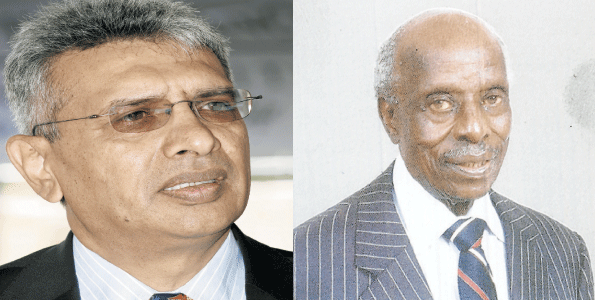 A sales agent, whose contract CMC managing director Bill Lay signed on his first day in office, was the flame that sparked the wars in the motor dealer’s boardroom.
A sales agent, whose contract CMC managing director Bill Lay signed on his first day in office, was the flame that sparked the wars in the motor dealer’s boardroom.
Hired in June without the knowledge of the board, the agent has received millions of shillings in inflated and back-dated commission payments that offer fresh insights into how the troubled company may be losing money to its associates.
Pewin Motors, a company associated with Peter Kirigua, a former employee of rival motor dealer DT Dobie, was appointed a commissions agent for CMC on June 1 — the day Mr Lay officially assumed office as chief executive.
Invoices seen by the Kenya Car Bazaar show that Pewin Motors received Sh11.7 million for the sale of 50 Land Rovers to the government, yet the transaction was concluded three months before Pewin was awarded the agency contract.
Peter Muthoka, who chaired the CMC board at the time, denies knowledge of the contract, terming the payments irregular.
But Mr Lay argued that there was nothing wrong with the payment because Pewin took over all pending sales deals, including those that had commenced before it signed the contract.
“An LPO is just the beginning of a sales transaction and there is nothing unusual in the payments,” said Mr Lay, adding that it takes up to a year to finalise government transactions.
Mr Kirigua said Pewin Motors had sent many invoices to CMC and he was not aware of any backdated payments.
He, however, said that his contract had been signed “much earlier” than June 1, differing with Mr Lay, who confirmed the contract date as per the documents seen by Kenya Car Bazaar.
In yet another questionable deal, CMC Motors paid Sh2.9 million in commissions to Pewin Motors at double the contract price of three per cent for the sale of Ford Ranger double cabin vehicles to the government.
Though Mr Lay did not deny the payment, he dismissed the Pewin Motors contract seen by Kenya Car Bazaar as having been “a draft,” despite signing it on June 1.
Sources at CMC said the number of questionable invoices rose to “alarming” levels in the months that followed, causing shareholders millions of shillings in losses. To show the extent to which the invoices weighed down on the company’s profits, an internal management account for the month of October indicates that CMC made a net profit of Sh20.7 million – the same month that Pewin Motors collected Sh11.7 million in sales commissions (more than half the profits).
The management has issued a profit warning for the year ended September, meaning that its net earnings will fall more than 25 per cent below the Sh406.6 million reported last year.
Correspondence shows that Mr Lay’s decision to hire Pewin Motors against the wishes of a section of the company’s directors is at the heart of a bitter boardroom dispute that has nearly paralysed operations at the firm. Pewin Motors, which had the backing of Mr Lay, was hired as a sales agent earning a commission of six per cent on gross sales of CMC’s flagship brands Jaguar and Land Rover vehicles, heavy equipment, trailers and spare parts.
The agent also earns a commission of three per cent on gross sales of Ford, Mazda, Volkswagen and Suzuki brands.
Mr Muthoka, who chaired the board, was ousted in a boardroom coup on September 8 after he opposed the award of the agency deal to Pewin.
Paul Ndung’u and Joel Kibe, who together own 18.8 per cent per cent shares in CMC, are said to have whipped other board members into voting against Mr Muthoka in the acrimonious board meeting that came after months of simmering tensions between the directors.
Mr Muthoka based his opposition to the contract on the argument that it was exorbitant and could end up costing CMC up to Sh635 million based on last year’s sales figures.
He argued that CMC, for example, earned a profit of about Sh1.05 million on the sale of a single Sh18 million Range Rover Sport vehicle, yet as per the contract Pewin Motors stood to earn Sh1.08 million for a similar sale.
He further argued that the contract, which had the official seal of the company, was not approved by the board, and was therefore irregular.
“My opposition to this contract is the biggest reason why I was ousted as chairman of the board, and why I am being fought up to now,” said Mr Muthoka in an interview.
Besides Mr Kirigua, the identities of the other owners of Pewin Motors remain unknown but the speed with which its invoices are cleared and paid at CMC indicates that it has the backing of powerful forces.
One invoice sent by Pewin was received on November 4, approved by the management on the same day, and was paid out on the same day. Yet another dated October 13 was received, approved and paid on the same day.
“The normal payment period for CMC is 120 days; it is extra-ordinary that these invoices are received and paid on the same day,” said a source at the company.
In normal circumstances, invoices by all CMC debtors are received by respective departments for approval, before they are forwarded to the finance director for payment.
However, Pewin Motors invoices are said to be handled directly by the finance department, creating a loophole for unauthorised payments.
Mr Lay’s proposed re-location of CMC’s flagship franchises — Land Rover and Volks Wagen — to Sameer Industrial Park at a cost of Sh250 million was also said to have deepened the wedge in the boardroom.
According to insiders at the company, CMC had just concluded a Sh35 million renovation of the Land Rover showroom and workshop according to the UK company’s specifications. Land Rover were said to be happy with the quality of the work, and only suggested minor modifications at the reception area. The suggestion to spend Sh250 million on a rival’s premises, and a further Sh8 million rent, did not sit well with a section of the board, which belatedly learnt that Mr Lay had already named a re-location committee.








![Top 20 Used Cars to Avoid Buying in Kenya – [PHOTOS]](../../../blog/wp-content/uploads/2013/11/top-used-unreliable-cars-to-avoid2-80x60.jpg)

![Top 20 Used Cars to Avoid Buying in Kenya – [PHOTOS]](../../../blog/wp-content/uploads/2013/11/top-used-unreliable-cars-to-avoid2-100x70.jpg)





